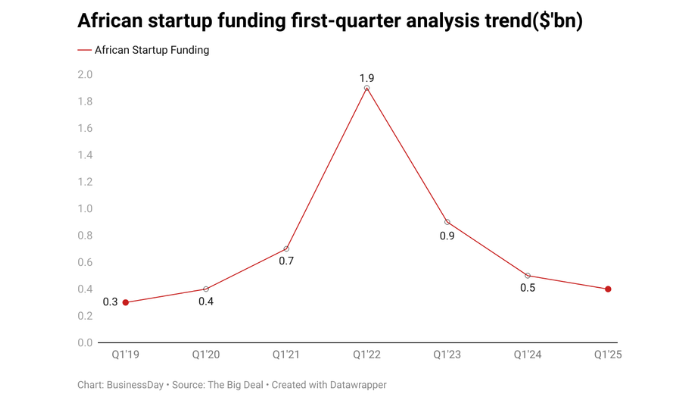Funding into the African tech ecosystem dropped five percent to $460 million in the first quarter of 2025.
This underscored the consistent drop in venture capital funding on the continent, which fell from $486 million raised in the same period of 2024, according to Africa: The Big Deal.
The data insight firm, which tracks funding rounds of $100,000 and above, revealed that nearly $300 million was raised by start-ups in January, and fell to $119 million in February.
March saw one of the lowest monthly totals since late 2020, with just $50 million in funding announced. Despite a steady number of start-ups securing funding, the lack of deals exceeding $10 million significantly impacted overall investment figures.
“Q1 2025 is the second-lowest quarter in terms of start-up funding since late 2020,” the insight firm noted. “However, things are looking more positive if we focus on the number of start-ups that announced at least $1 million in funding during the quarter, with 52 such deals aligning with the 2023-2024 average.”
The report further disclosed that the lion’s share of the funding, 83 percent, went to the Big Four: Kenya, Nigeria, South Africa, and Egypt.
Kenya and Nigeria each attracted roughly $100 million in funding, followed closely by South Africa with $100 million. Egypt secured $61 million (14 percent), while Togo emerged as a surprise entry in the top five, buoyed by Gozem’s $30 million Series B funding round.
Read also: The rise of African tech startups: Opportunities, challenges, and solutions
Fintech Leads the Way
Fintech remained the dominant sector, accounting for nearly half (46 percent) of total investment, the report disclosed.
“Notable fintech deals included LemFi’s $53 million raise and Naked’s $38 million. The energy sector followed with an 18 percent share of the total funding, while logistics and transportation startups secured 10 percent,” Big Deal reported.
Women-Led Start-ups Still Underfunded
Despite ongoing conversations around gender inclusivity in venture capital, female-led start-ups continued to receive a disproportionately small share of funding.
“Just over 2 percent ($10 million) of Q1 funding went to female CEOs, with the largest such deal being a $6.2 million grant awarded to South African biotech firm African Biologics. Excluding grant funding, female-led start-ups accounted for a mere 0.7 percent of all investments,” it said.
In contrast, Big Deal added that 79 percent of total funding went to either solo male founders (11 percent) or all-male founding teams (67 percent). While diverse founding teams attracted 20 percent of the investment, this remains a modest improvement compared to previous quarters.
“Meanwhile, just 1 percent of funding was directed toward solo female founders or female-only teams,” the report said.
